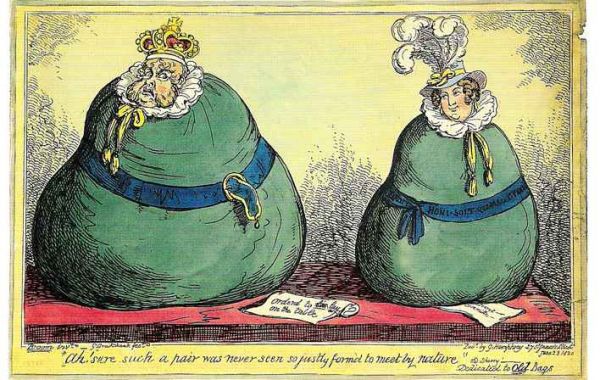
On February 18, 1818 former President John Adams wrote in a private letter:
‘...what do we mean by the American Revolution? Do we mean the American war? The Revolution was effected before the war commenced. The Revolution was in the minds and hearts of the people; a change in their religious sentiments, of their duties and obligations ... This radical change in the principles, opinions, sentiments, and affections of the people was the real American Revolution.’ Letter to Hezekiah Niles, 13 Feb. 1818
July 4th, 1820 was 44 years and two generations beyond 1776. Thomas Jefferson was already in declining health. In six more years, he and John Adams would both die the same day, July 4th, 1826.
But on July 4th, 1820 the House of Lords of the United Kingdom of Great Britain and Ireland was faced with a different problem. It too was a time for radical changes ‘in their religious sentiments, duties and obligations.’ On that day the House of Lords heard the report of a Secret Committee tasked to examine one of two green bags George IV had sent on June 6, 1820. The king sent one bag to the House of Lords and the other to the Commons.
Like the articles of impeachment concocted by Nancy Pelosi’s Democrats just a few months ago, this report formed the basis for the House of Lords to begin the trial of Queen Caroline known today as the Pains and Penalties trial. That nation was divided by partisan bickering and outrage over the proceedings as much as the allegations presented, just as we are today.
The Committee reported that they had ‘examined, with all the attention due to so important a subject the documents which have been laid before them, and they find that those documents contain allegations supported by the concurrent testimony of a great number of persons in various situations of life, and residing in different parts of Europe, which deeply affect the honour of the queen...’ Hansard 4 July, 1820, Lords Sitting
The Earl Gray – you may remember his mix of tea – complained about many of the procedures that led up to this point. The Earl of Carnarvon did not like the fact that the Committee had accepted the sworn testimony in the Green Bag but had not heard directly from witnesses as might be the case before a Grand Jury. The Earl of Darnley ‘was afraid that nothing but mischief could result from the report laid on the table, and sincerely wished that the proceedings had been avoided.’ ibd. The Marquis of Buckingham also wished the question had not been brought forward if it could have been prevented, ‘because he thought it would affect the honour of the Crown, and the peace and tranquillity of the country...’ ibd.
As chairman of the Secret Committee appointed to examine the Papers, the Earl of Harrowby answered these objections. The Earl of Liverpool said that ‘in consequence of the report which their lordships had just heard, it was incumbent on him to give notice, that he should tomorrow bring in a bill, founded upon the report...At the same time all facilities would be given to the illustrious personage whose conduct was implicated so much, for the purposes of defence or exculpation in every way.’ ibd. He concluded by moving that their lordships be summoned for to-morrow.
The motion carried.
The following day, on July 5th, 1820 that bill was read.
‘An Act to deprive her Majesty Queen Caroline Amelia Elizabeth, of the Title, Prerogatives, Rights, Privileges and Exemptions, of Queen-Consort of this Realm, and to dissolve the Marriage between his Majesty and the said Caroline Amelia Elizabeth...’ Hansard 5 July, 1820, Lords Sitting, COPY OF THE BILL OF PAINS AND PENALTIES AGAINST HER MAJESTY.
Why its important.
The Pains and Penalties trial ushered in the modern era of mass politics and trial by media. Political posturing hasn’t changed since. Whipping people into some frenzy by telling half-truths and making sensational claims has continued to this day, the only difference is how available, how instantaneous these tactics have become.
Christian men and women were shocked and angered by the claims made against the Queen. The conservatives who supported the king’s claims were abused for having made the thing public in the first place. Liberals who supported the Queen further shocked the nation by making counter claims against King George IV. Too many accusations against both proved true. Politicians overlooked the sins of their own ‘side’ to dwell on the other’s.
Months of public bickering would follow. After dragging the entire nation through the mud, Queen Caroline was neither found guilty nor was she absolved. In the end, a bare majority of Lords voted that they were ‘content’ that the Queen should be deprived of her title and rights and that the bill should be sent down to the lower house to ratify.
Lord Liverpool saw that the nation had become so divided there was no chance the bill would ever pass in the House of Commons. Having won a pyrrhic ‘victory’ in the Lords, he withdrew the bill. It was never sent down to the Commons.
Instead, riots ensued. Sound familiar?
Solomon reminds us to this day:
‘Is there anything whereof it may be said, See this is new? It hath been already of old time, which was before us. There is no remembrance of former things, neither shall there be any remembrance of things that are to come with those that shall come after.’ Eccl 1:9-11
In Leviticus, there were statutes to ‘put difference between holy and unholy, and between clean and unclean.’ Lev 10:10 Even the priest who removed carcases had to wash and yet was still ‘unclean until even.’ Lev 11:28 Dealing with defilement defiles. Its bad enough to have to wade through dirty politics in the news. How much worse for brothers and sisters in Christ who ‘vex their righteous souls’ in the very gates of Sodom.
Too many of us who read the news, who do not have complete knowledge and have not been given the position or authority to judge love to pontificate from afar, often equivocating right with wrong if it fits our narrative.
The ‘I’m OK, You’re OK’ revolution changed our basic American values. It cheapened Biblical morals we once knew were essential. The only thing ‘agreeing to disagree’ has ever accomplished was to perpetuate disagreement. cf: 1 Cor 1:10 Today, we are reaping the whirlwind of having said evil is ‘OK’ and ‘OK is what we all are.’ Isa 5:20-21, 23-24 ‘His hand is stretched out still...’ Isa 5:25
In the 1820’s a small group of young millennials saw what was happening in their day. They rejected the traditions they inherited, and dug into the Scriptures for themselves. Some look at the apostle Peter as ‘the first Pope.’ His first epistle tells us a lot about the ‘priesthood of all believers.’ First, we are called to be holy priests ‘to offer up spiritual sacrifices acceptable to God by Jesus Christ.’ 1 Pet 2:5 Second, we are called to be royal priests ‘that ye should shew forth the praises of him who hath called you out of darkness into his marvelous light.’ 1 Pet 2:9
Jesus told the woman at the well, this is not just for a chosen few, but for everyone who trusts Him for salvation, even the worst of us. cf: John 4:14, 23-24
2 Chronicles 7:14 describes four phases of revival which are as true today as they have been throughout history. 1) Humble ourselves, 2) Pray, 3) Seek the LORD’s direction, 4) turn from our wicked ways. We can see the way God actively resists the proud in others. Are we prepared to begin that process and humble ourselves? 1 Pet 5:6-11







